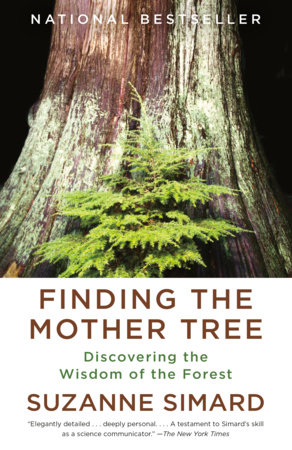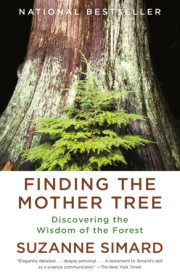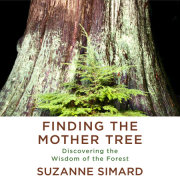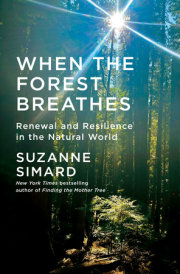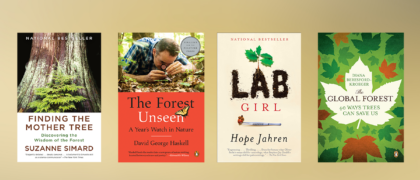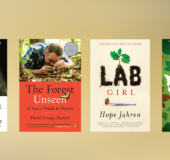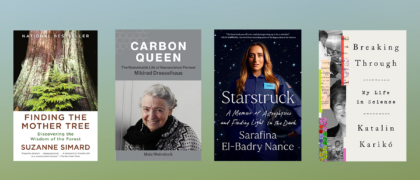1
Ghosts in the Forest
I was alone in grizzly country, freezing in the June snow. Twenty years old and green, I was working a seasonal job for a logging company in the rugged Lillooet Mountain Range of western Canada.
The forest was shadowed and deathly quiet. And from where I stood, full of ghosts. One was floating straight toward me. I opened my mouth to scream, but no sound emerged. My heart lodged in my throat as I tried to summon my rationality—and then I laughed.
The ghost was just heavy fog rolling through, its tendrils encircling the tree trunks. No apparitions, only the solid timbers of my industry. The trees were just trees. And yet Canadian forests always felt haunted to me, especially by my ancestors, the ones who’d defended the land or conquered it, who came to cut, burn, and farm the trees.
It seems the forest always remembers.
Even when we’d like it to forget our transgressions.
It was midafternoon already. Mist crept through the clusters of subalpine firs, coating them with a sheen. Light-refracting droplets held entire worlds. Branches burst with emerald new growth over a fleece of jade needles. Such a marvel, the tenacity of the buds to surge with life every spring, to greet the lengthening days and warming weather with exuberance, no matter what hardships were brought by winter. Buds encoded to unfold with primordial leaves in tune with the fairness of previous summers. I touched some feathery needles, comforted by their softness. Their stomata—the tiny holes that draw in carbon dioxide to join with water to make sugar and pure oxygen—pumped fresh air for me to gulp.
Nestled against the towering, hardworking elders were teenaged saplings, and leaning into them were even younger seedlings, all huddling as families do in the cold. The spires of the wrinkled old firs stretched skyward, sheltering the rest. The way my mother and father, grandmothers and grandfathers protected me. Goodness knows, I’d needed as much care as a seedling, given that I was always getting into trouble. When I was twelve, I’d crawled along a sweeper tree leaning over the Shuswap River to see how far out I could go. I tried to retreat but slipped and fell into the current. Grampa Henry jumped into his hand-built riverboat and grabbed my shirt collar right before I would have disappeared into the rapids.
Snow lay deeper than a grave nine months of the year here in the mountains. The trees far outmatched me, their DNA forged so they’d thrive despite the extremes of an inland climate that would chew me up and spit me out. I tapped a limb of an elder to show gratitude for its hovering over vulnerable offspring and nestled a fallen cone in the crook of a branch.
I pulled my hat over my ears while stepping off the logging road and waded deeper into the forest through the snow. Despite it being only a few hours before darkness, I paused at a log, a casualty of saws that had cleared the road right-of-way. The pale round face of its cut end showed age rings as fine as eyelashes. The blond-colored earlywood, the spring cells plump with water, were edged by dark-brown cells of latewood formed in August when the sun is high and drought settles in. I counted the rings, marking each decade with a pencil—the tree was a couple hundred years old. Over twice the number of years my own family had lived in these forests. How had the trees weathered the changing cycles of growth and dormancy, and how did this compare to the joys and hardships my family had endured in a fraction of the time? Some rings were wider, having grown plenty in rainy years, or perhaps in sunny years after a neighboring tree blew over, and others were almost too narrow to see, having grown slowly during a drought, a cold summer, or some other stress. These trees persisted through climatic upheavals, suffocating competition, and ravaging fire, insect, or wind disruptions, far eclipsing the colonialism, world wars, and the dozen or so prime ministers my family had lived through. They were ancestors to my ancestors.
A chattering squirrel ran along the log, warning me away from his cache of seeds at the base of the stump. I was the first woman to work for the logging company, an outfit that was part of a rough, dangerous business starting to open its doors to the occasional female student. The first day on the job, a few weeks back, I’d visited a clear-cut—a complete felling of trees in a thirty-hectare patch—with my boss, Ted, to check that some new seedlings had been planted according to government rules. He knew how a tree should and should not be planted, and his low-key approach kept workers going through their exhaustion. Ted had been patient with my embarrassment at not knowing a J-root from a deep plug, but I’d watched and listened. Soon enough, I was entrusted with the job of assessing established plantations—seedlings put in to replace harvested trees. I wasn’t about to screw up.
Today’s plantation awaited me beyond this old forest. The company had chopped down a large parcel of velvety old subalpine firs and planted prickly needled spruce seedlings this last spring. My task was to check the progress of those new growths. I hadn’t been able to take the logging road into the clear-cut because it had been washed out—a gift, since I could detour past these mist-wrapped beauties, but I stopped at a massive pile of fresh grizzly scat.
Fog still draped the trees, and I could have sworn something was sliding along in the distance. I looked harder. It was the pale green trusses of the lichen called old man’s beard because of the way it sways from branches. Old lichen that particularly thrived on old trees. I plunged the button on my air horn to warn off the specter of bears. I’d inherited my fear of them from my mother, who was a child when her grandfather, my great-grampa Charles Ferguson, shot and killed one that was inches from mauling her on the porch. Great-Grampa Charles was a turn-of-the-twentieth-century pioneer in Edgewood, an outpost in the Inonoaklin Valley along the Arrow Lakes of the Columbia basin in British Columbia. With axes and horses, he and his wife, Ellen, cleared the Sinixt Nation land they had homesteaded to grow hay and tend cattle. Charles was known to wrestle with bears and shoot wolves that tried to kill his chickens. He and Ellen raised three children: Ivis, Gerald, and my grandmother Winnie.
I crawled over logs covered with moss and mushrooms, inhaling the evergreen mist. One had a river of tiny Mycena mushrooms flowing along the cracks down its length before fanning along a splay of tree roots that dwindled to rotten spindles. I’d been puzzling over what roots and fungi had to do with the health of forests—the harmony of things large and small, including concealed and overlooked elements. My fascination with tree roots had started from my growing up amazed at the irrepressible power of the cottonwoods and willows my parents had planted in our backyard when their massive roots cracked the foundation of our basement, tilted over the doghouse, and heaved up our sidewalk. Mum and Dad fell into worried discussions of what to do with the problem they’d unwittingly created in our little plot of land in trying to reconstruct the feel of trees surrounding their own childhood homes. I’d watched in awe each spring as a multitude of germinants emerged from cottony seeds amid halos of mushrooms fanning around the base of the trees, and I’d become horrified, at eleven, when the city ran a pipeline spewing foamy water into the river beside my house, where the effluent killed the cottonwoods along the shore. First the tops of the crowns thinned, then black cankers appeared around the furrowed trunks, and by the next spring the great trees were dead. No new germinants got established among the yellow outflow. I wrote to the mayor, and my letter went unanswered.
I picked one of the tiny mushrooms. The bell-shaped elf caps of the Mycena were dark brown at the apex and faded into translucent yellow at the margins, revealing gills underneath and a fragile stem. The stipes—stems—were rooted in the furrows of the bark, helping the log decay. These mushrooms were so delicate it seemed impossible they could decompose a whole log. But I knew they could. Those dead cottonwoods along the riverbank in my childhood had fallen and sprouted mushrooms along their thin, cracking skin. Within a few years, the spongy fibers of decayed wood had completely disappeared into the ground. These fungi had evolved a way to break down wood by exuding acids and enzymes and using their cells to absorb the wood’s energy and nutrients. I launched off the log, landed with my caulk spikes in the duff, and grabbed clumps of fir saplings to leverage myself up the slope. The saplings had found a spot to capture a balance between the light of the sun and the wetness of the snowmelt.
A Suillus mushroom—tucked near a seedling that had established a few years back—was wearing a scaly brown pancake cap over a yellow porous underbelly and a fleshy stem that disappeared into the ground. In a burst of rain, the mushroom had sprung out of the dense network of branching fungal threads running deep through the forest floor. Like a strawberry fruiting from its vast, intricate system of roots and runners. With a boost of energy from the earthen threads, the fungal cap had unfurled like an umbrella, leaving traces of a lacy veil hugging the brown-spotted stem about halfway up. I picked the mushroom, this fruit of the fungus that otherwise lived mainly belowground. The cap’s underside was like a sundial of radiating pores. Each oval-shaped opening housed minuscule stalks built to discharge spores like sparks from a firecracker. Spores are the “seeds” of fungi, full of DNA that binds, recombines, and mutates to produce novel genetic material that is diverse and adapted for changing environmental conditions. Sprinkled around the colorful cavity left by the picking was a halo of cinnamon-brown spores. Other spores would have caught an updraft, latched on to the legs of a flying insect, or become the dinner of a squirrel.
Extending downward in the tiny crater still holding the remains of the mushroom’s stem were fine yellow threads, the strands braiding into an intricately branching veil of fungal mycelium, the network that blankets the billions of organic and mineral particles making up the soil. The stem bore broken threads that had been part of this web before I ungraciously ripped it from its moorings. The mushroom is the visible tip of something deep and elaborate, like a thick lace tablecloth knitted into the forest floor. The threads left behind were fanning through the litter—fallen needles, buds, twigs—searching for, entwining with, and absorbing mineral riches. I wondered whether this Suillus mushroom might be a type of decay fungus like the Mycenas, a rotter of wood and litter, or if it had some other role. I stuck it into my pocket along with the Mycena.
The clear-cut where the seedlings replaced the chopped-down trees was still not visible. Dark clouds were gathering, and I pulled my yellow rain jacket out of my vest. It was worn from bushwhacking and not as waterproof as it should have been. Each step farther from the truck added to an aura of danger and my foreboding that I wouldn’t be on the road by nightfall. But I’d inherited an instinct for pushing through hardship from Grannie Winnie, a teenager when her mother, Ellen, succumbed to the flu in the early 1930s. The family was snowed in and bedridden, with Ellen dead in her room, when the neighbors finally broke through the frozen valley and chest-deep snow to check on the Ferguson clan.
My boot slipped, and I grabbed a sapling, which came loose in my hand as I tumbled down the pitch, flattening other saplings before coming to rest against a sodden log, still clutching the octopus of jagged roots. The young tree looked to be a teenager, the whorls of lateral branches demarcating each year adding up to about fifteen. A rain cloud started to spit, soaking my jeans. Drops beaded on the oilskin of my scruffy jacket.
There was no room for weakness on this job, and I’d cultivated a tough exterior in a boy’s world for as long as I could remember. I wanted to be as good as my younger brother, Kelly, and the ones who had Québécois names like Leblanc and Gagnon and Tremblay, so I learned to play street ice hockey with the neighborhood gang when the temperature was minus twenty. I played goalie, the least coveted position. They took hard shots at my knees, but I kept my black-and-blue legs concealed under my jeans. The way Grannie Winnie kept on as best she could, resuming her job of galloping her horse through the Inonoaklin Valley, delivering mail and flour to the homesteads, soon after her mother died.
I stared at the clump of roots in my fist. Clinging to them was glistening humus that reminded me of chicken manure. Humus is the greasy black rot in the forest floor sandwiched between the fresh litter from fallen needles and dying plants above and the mineral soil weathered from bedrock below. Humus is the product of plant decay. It’s where the dead plants and bugs and voles are buried. Nature’s compost. Trees love to root in the humus, not so much above or below it, because there they can access the bounty of nutrients.
But these root tips were glowing yellow, like lights on a Christmas tree, and they ended in a gossamer of mycelium of the same color. The threads of this streaming mycelium looked close to the same color as those radiating into the soil from the stems of the Suillus mushrooms, and from my pocket I took out the one I’d picked. I held the clump of root tips with its cascading yellow gossamer in one hand and the Suillus mushroom with its broken mycelium in the other. I studied them closely, but I could not tell them apart.
Maybe Suillus was a friend of the roots, not a decomposer of dead things as Mycena was? My instinct has always been to listen to what living things are saying. We think that most important clues are large, but the world loves to remind us that they can be beautifully small. I began to dig into the forest floor. The yellow mycelium seemed to coat every minuscule particle of soil. Hundreds of miles of threads running under my palms. No matter the lifestyle, these fungal branching filaments, called hyphae—along with the mushroom fruit they spawned—appeared to be only a smattering of the vast mycelium in the soil.
Copyright © 2021 by Suzanne Simard. All rights reserved. No part of this excerpt may be reproduced or reprinted without permission in writing from the publisher.

